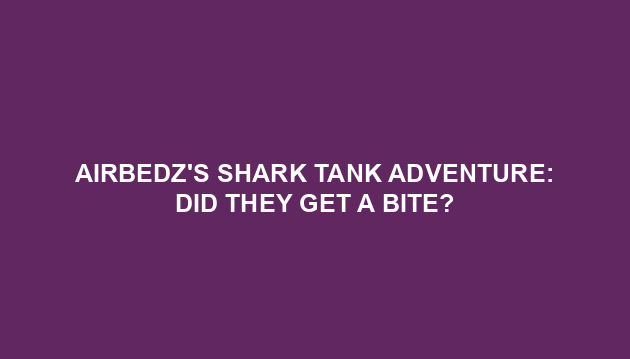Imagine a world where visually impaired individuals navigate their daily lives with unparalleled ease and independence. That’s the promise of Aira, now rebranded as FreePower, a revolutionary assistive technology platform that leverages the power of AI and human agents to empower the blind and visually impaired. But could this groundbreaking technology, with its compelling story and significant potential, win over the notoriously tough Sharks in the Shark Tank? Let’s dive deep into the possibilities.
From Aira to FreePower: A Name Change and a Renewed Focus
Aira, initially known for its on-demand, live video assistance, has undergone a significant transformation, rebranding itself as FreePower. This rebranding isn’t just a cosmetic change; it reflects a strategic shift in focus. While the core technology of connecting users with trained agents remains, FreePower is expanding its services and functionalities, aiming for broader accessibility and a wider user base.
The shift to FreePower suggests a desire to move beyond the niche market of assistive technology for the blind and visually impaired, targeting a broader audience seeking empowering technology for independent living. This ambition is key to understanding their potential success (or failure) in the Shark Tank arena.
The Aira (FreePower) Technology: How Does It Work?
Aira, or FreePower, uses a sophisticated blend of AI and human expertise. Users wear smart glasses equipped with a camera that streams live video to remote agents. These agents, specially trained to assist the visually impaired, provide real-time information and guidance. Imagine needing to cross a busy street – the agent can analyze the video feed, identify potential hazards, and verbally guide you safely across.
The AI component plays a crucial role in pre-processing the video stream, identifying objects and scenes, and assisting the agents in providing accurate and efficient assistance. This combination of human intuition and AI precision makes the system remarkably effective and adaptable.
Here’s a breakdown of the key features:
- Live Video Streaming: Real-time visual input allows agents to understand the user’s environment instantly.
- Trained Agents: Highly skilled agents provide accurate and empathetic assistance.
- AI-Powered Object Recognition: The AI helps agents identify objects and scenes quickly.
- Navigation Assistance: Guidance for navigating unfamiliar environments.
- Reading Assistance: Agents can read documents, menus, and other text-based information.
- Product Identification: Identifying products in stores or online.
The Shark Tank Potential: What the Sharks Might See (and What They Might Miss)
The Sharks are known for their keen business acumen, but will they fully grasp the transformative potential of FreePower? Here’s a breakdown of potential pros and cons from a Shark Tank perspective:
Potential Pros:
- Massive Untapped Market: The visually impaired population represents a significant market with a high unmet need for assistive technology.
- Scalability: The technology is scalable; the platform can handle a large number of users simultaneously.
- Recurring Revenue Model: Subscription-based services offer predictable revenue streams.
- Strong Social Impact: The technology offers a powerful solution to a critical societal challenge, appealing to investors who prioritize social responsibility.
- Potential for Expansion: The core technology could be adapted for other assistive technology applications, broadening its market reach.
Potential Cons:
- High Operational Costs: Training and employing skilled agents is expensive.
- Dependence on Reliable Internet Connectivity: The system requires a stable internet connection, which can be a challenge in some areas.
- Privacy Concerns: The use of live video streaming raises privacy concerns that need to be carefully addressed.
- Competition: The assistive technology market is becoming increasingly competitive.
- Pricing and Market Penetration: Finding the right pricing model to balance profitability and accessibility is crucial.
Addressing the Sharks’ Potential Concerns
To succeed in the Shark Tank, the FreePower team needs to address the potential concerns proactively. They need a compelling pitch that highlights:
- A clear and concise explanation of the technology and its benefits.
- A robust business model that demonstrates scalability and profitability.
- A comprehensive strategy for addressing privacy concerns.
- A detailed market analysis that showcases the size and potential of the target market.
- A strong team with the expertise and passion to execute the business plan.
The Verdict: Can FreePower Secure a Deal?
The success of FreePower in the Shark Tank hinges on their ability to effectively communicate the value proposition of their technology, address potential concerns, and present a compelling business case. The Sharks are known for their critical assessment, but they also recognize the potential of groundbreaking technologies with a strong social impact. With a well-prepared pitch, a strong team, and a clear vision for the future, FreePower has a real chance to secure a deal and bring its transformative technology to a wider audience.
Ultimately, the Shark Tank appearance will be a crucial moment for FreePower, a test of their ability to translate their innovative technology into a successful business venture. The journey from Aira to FreePower is one of evolution and ambition, and the Shark Tank could be the catalyst for its next chapter of growth and impact.
The potential for FreePower to not only secure funding but also to raise awareness of its mission is immense. This could be the launchpad to a new era of accessibility and independence for millions around the world. Whether or not they get a deal, the exposure alone could be transformative.
The world watches with anticipation! Will the Sharks see the potential? Only time will tell.


GIPHY App Key not set. Please check settings